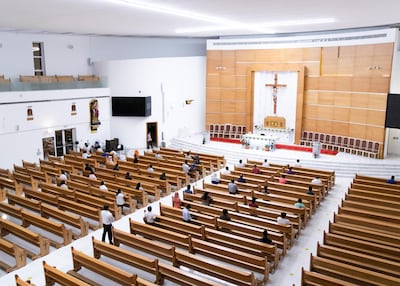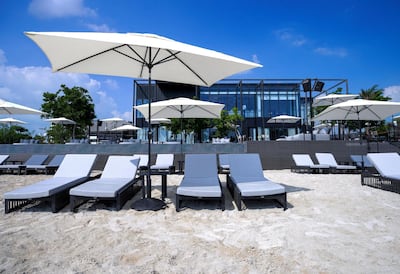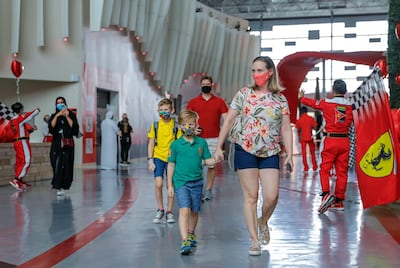Follow the latest updates on the Covid-19 pandemic here.
As cases of Covid-19 rise around the globe, the UAE is working to keep pace with developments and adjust regulations to ensure people are kept safe while economic activity resumes.
In August, the National Emergency, Crisis and Disaster Management Authority set out the latest nationwide changes. Ncema said local authorities in each emirate would now be responsible for overseeing and amending rules as they see fit, allowing for greater flexibility depending on the local situation.
Individual emirates, including Dubai, have previously set out different capacity levels and regulations for events, while enforcing federal rules, for example, ensuring that masks are worn in all public places.
Here is The National's regular update on the rules.
As of December 21, here are the Covid-19 rules in Dubai:
- Authorities are encouraging people to receive a booster shot six months after their second dose of a vaccine
- The two-metre social distancing rule has been reduced to one metre in some areas of the emirate
- New rules are in place for travel into the UAE from neighbouring countries
- To enter a federal government department, unvaccinated people must present a negative PCR test result received within 48 hours. From January 3, people will need to have green status on Al Hosn to enter federal government offices across all emirates
- Hotels have returned to full occupancy, while entertainment venues have capacity limits of 70 per cent (up from 50 per cent)
- Weddings can be held with up to 100 people at venues and hotels but all staff and guests must be vaccinated
- Restaurants and cafes can operate at 80 per cent capacity and can remain open until 3am
- The number of people who can sit at one table is 10 for restaurants and six at cafes
- Private gatherings held in homes, including weddings, are capped at 30 guests
- Concerts, sports spectator events and social and institutional events are permitted, providing the audience, participants and staff are vaccinated against Covid-19
- The maximum attendance for large public events that require permits is 1,500 for indoors and 2,500 for outdoors
- Face masks are mandatory in public and in private gatherings and people are required to maintain physical distance from others
As of December 21, here are the Covid-19 rules in Abu Dhabi:
- A green pass system is in place requiring individuals to be vaccinated and regularly tested to access many public places. To maintain the green status, people must undergo a PCR test every two weeks. Green status is also required to enter all federal government offices across the country
- Authorities are encouraging people to receive a booster shot six months after their second dose of a vaccine
- New rules are in place for travel into the UAE from neighbouring countries
- Face masks are no longer required at all times and can be removed in certain areas and under specific circumstances
- A negative PCR test result received within 96 hours is needed to attend events and exhibitions
- Quarantine is removed for vaccinated people travelling to Abu Dhabi, as well as for unvaccinated individuals arriving from a green list country. They must instead undergo PCR tests, without quarantine
- Electronic wristbands, used to monitor home quarantine, are no longer in use for international travellers or people who have come into contact with positive Covid-19 cases. However, they are still required for individuals who test positive for the coronavirus
- Travellers to Abu Dhabi must register with the Federal Authority for Identity and Citizenship (ICA) before boarding flights
- Government entities in Abu Dhabi returned to 100 per cent office capacity. Vaccinated employees and those exempted must show green status on Al Hosn app and follow government testing requirements. Unvaccinated employees must test every seven days
- Capacity limits have increased at gyms, shops, cafe's, restaurants, malls, schools, museums, resorts and theme parks
- Up to 10 people can sit together at a cafe or restaurant, up from four. Previously, family members could sit together with no limit on numbers
- Indoor events can operate at 80 per cent capacity, up from 60, provided those attending wear face masks and present a negative PCR test received within 96 hours.
- Wedding halls can operate at a maximum of 60 per cent capacity but the number of guests should not exceed 100 for indoor halls, 300 for open-air wedding venues, and 60 for weddings hosted at home. Guests should be fully vaccinated and the second dose should have been taken at least two weeks before the event. A negative PCR test taken no more than 48 hours before the event is also a must.
- Malls and shopping centres are limited to 80 per cent capacity, up from 40 per cent
- Cinemas, recreational facilities, galleries and museums can operate at 80 per cent capacity, up from 30 per cent
- Operating capacity for live events is set at 60 per cent, provided that social distancing, mask-wearing and regular sanitisation guidelines are observed
- To attend a live event, individuals must have received two doses of a coronavirus vaccine with the second dose having been taken within the previous six months. For senior citizens and people with chronic diseases, their second dose should have been received within the previous three months. All attendees should also present a negative PCR test received within 48 hours of the live event
- Public transportation can operate at 75 per cent capacity, up from 50 per cent. Unvaccinated people must present a negative PCR test result, received within 48 hours, to enter a federal government department
- People who have come into contact with a positive Covid-19 case must undergo home quarantine but do not require an electronic wristband
- Gyms as well as private beaches and swimming pools cannot be more than half full
What testing is required to enter Abu Dhabi from other emirates?
New checks designed to identify commuters with Covid-19 are in effect at the Abu Dhabi-Dubai border from December 19.
Motorists stop at a gated checkpoint and officers use a mobile phone application to scan for signs of fever and other symptoms of Covid-19. Anyone found to have signs of the virus is sent for a free antigen test at a nearby screening centre, with the results ready in 20 minutes.
People who reside in Abu Dhabi and test positive will be sent home to quarantine for 10 days. Drivers from outside Abu Dhabi must return home and alert the authorities in their home emirate.
When can I remove my face mask?
Wearing face masks in most public places is mandatory throughout the UAE with Dh3,000 fines for anyone who does not comply.
People should keep their face masks on while in public whenever possible to protect themselves against infection. However, there are occasions when you can take it off without risk of being fined.
In Abu Dhabi, people are not required to wear their mask when exercising in a public place, at the beach or at the pool. On September 22, the Ministry of Health and Prevention and Ncema announced masks are no longer required while undergoing "personal services" including hair cuts, facials or other spa services that involved the head or face. Masks are no longer mandatory during health appointments at medical centres or clinics while undergoing diagnosis and treatment or while travelling in a car with people who live in the same household.
In Dubai, people are allowed to remove their mask when exercising alone outdoors. In Abu Dhabi, people have to wear their masks while exercising, but can lower them if feeling unwell at any point to catch their breath.
What are is the green pass system to access public places in Abu Dhabi?
Abu Dhabi restricted access to some public areas to only vaccinated people.
Those who remain unvaccinated are unable to access a number of venues, including restaurants, cafes, malls and shops.
The list also includes gyms, sports centres, health clubs, resorts, museums, galleries and theme parks, as well as universities, colleges, nurseries and schools.
Vaccinated people are admitted through having green status on Al Hosn, the UAE's vaccination app.
Green status is displayed on the app after a negative PCR test result. It remains valid for 30 days for fully vaccinated people who received their second dose at least 28 days prior.
What are the capacity limits in public places in Abu Dhabi?
In August, capacity limits increased to 80 per cent at malls, entertainment centres, cultural centres, museums, movie theatres, restaurants and cafes.
Operating capacities for health clubs, sports academies, gyms and spas remain at 50 per cent.
Community and sports events, including corporate events such as exhibitions and conferences, concerts and theatre plays are limited to 60 per cent capacity. Wedding halls will also be able to 100 people.
Officials authorised increasing the operating capacity of public transportation to 75 per cent, as well as taxi capacity, so that a taxi driver can travel with up to three passengers in a five-person taxi and four passengers in a seven-person taxi.
How many people can sit at a single table in a restaurant?
In Abu Dhabi, only four people can sit at a single table at a restaurant if they are not from the same household. The exception to the rule is for children, who can sit at the same table as their family. As of June 5, family members can sit together at restaurants and cafes with no limit of numbers. Larger mixed groups will be split into tables of four, spaced two metres apart.
In Dubai, 10 people can sit together at a restaurant. This is up from seven. The number of people who can sit together in a cafe is now six. Entertainment activities can resume in restaurants, cafes and shopping malls for a trial period of one month.
- Read more: Covid-19 restaurant etiquette: 5 things to keep in mind when dining out during the pandemic
What are the rules at a beach club or swimming pool?
Swimming pools and beach clubs are open across the country. Loungers are spaced two metres apart and capacity limits are in place in some emirates to prevent crowding.
Previously, visitors to beach clubs or private pools were required to wear face masks at all times except when swimming or eating - specifically when walking around. Under recent reduced restrictions, it is advisable to call ahead to find out requirements.
In Abu Dhabi, face masks are no longer mandatory at open beaches and swimming pools.
What are the UAE's Covid-19 fines?
Following the Covid-19 outbreak, the UAE introduced a list of fines to protect people from the virus' spread. They included Dh3,000 fines for not wearing a face mask in public and heftier fines for breaking mandated home quarantine or refusing to undergo Covid-19 testing.
In August, authorities updated the list to include a new focus on deception offences, including fines for cheating or providing incorrect information to evade quarantine or precautionary measures. See the full list here.
Are entertainment venues such as amusement parks open? What are the rules there?
Water parks and other amusement parks have all reopened. All have reduced capacity to prevent crowding on rides. Hand sanitiser stations and face masks are mandatory.
Visitors must pass through a thermal scanner on entry and sanitising stations are set up across the venue.
At regular theme parks, visitors must wear a face mask at all times, regularly sanitise their hands and avoid gathering in groups. Fabric masks, rather than disposable masks, are recommended because some rides do not allow disposable masks.
At water parks in Abu Dhabi, a quick-dry mask is handed out free for use between rides.
What are the rules at hotels?
Some hotels were briefly closed last year amid a global halt on international travel.
They have since reopened with safety measures in place. These include mandatory use of face masks, physical distancing and reduced capacities.
Buffets and brunches, which ceased briefly, have since resumed, but with partitions in place and staff on hand to serve food to prevent potential contamination.
Restaurants require reservations, more so than before the pandemic, because space is limited with tables kept two metres apart.
In Dubai, hotel occupancy is back at 100 per cent of total capacity.
The facilities are frequently sanitised to ensure the safety of guests.
Are public parks still open? What about gyms?
Public parks and beaches remain open but, in Abu Dhabi, have been capped at 50 per cent capacity.
Gyms in Abu Dhabi have had their capacities reduced to half to ensure visitors are correctly distanced from others.
In Dubai, gyms and fitness centres have brought in safety measures in a bid to cut the chance of coronavirus spreading among clients. Exercise classes have reduced capacity, equipment has been removed and some managers have made mask-wearing mandatory, even when doing strenuous exercise.

Is live entertainment allowed?
Live entertainment has resumed at restaurants, cafes and shopping malls in Dubai for a trial period of one month, after it had been halted for several months.
The trial period could be extended, Dubai Media Office said.
Music concerts, community sports events, spectator events and social and institutional events will be allowed on the condition that all members of audiences, participants and staff have been vaccinated.

How many of people are allowed to gather in a house?
In Abu Dhabi, up to 60 guests and 10 catering and hospitality staff are allowed to gather in a home but they must adhere to specific health and safety measures. These include wearing face masks and remaining at least two metres apart. Guests should be fully vaccinated and the second dose should have been taken at least two weeks before the event. They will be required to show a green pass on Al Hosn app.
A negative PCR test taken no more than 48 hours before the event is also a must. Guests will be checked for temperature on arrival and they must wear face masks at all times. The premises should be regularly sanitised.
A fine of Dh10,000 will be imposed on anyone who hosts, invites or organises social gatherings, meetings, private and public celebrations that exceed this number. Participants also face fines of Dh5,000 each.
In Dubai, authorities have said up to 30 people can attend a private gathering in someone's home, including a wedding reception, as long as precautionary measures are observed.
Social events such as weddings held in public venues can now have up to 100 people in attendance, so long as they are vaccinated. Previously, only 10 people were allowed at a wedding and all had to be related.

Are places of worship open?
Yes. All places of worship have reopened, including mosques, temples and churches.
Mosques can open at 50 per cent capacity for all but Friday prayers, which are capped at 30 per cent. Women's prayer halls in Dubai reopened from June 7 after closing in March 2020.
Churches are also open with a capacity limit of 30 per cent and worshippers can book their visits online to prevent crowding.
Hindu temples can receive up to 30 per cent of their maximum capacity, though entry times are restricted.
Strict safety measures are enforced at all places of worship to prevent the spread of Covid-19.
How many people are allowed in a car?
Only three people can travel in the same car, including the driver, if they are not from the same family. If they are from the same family, you can have more than three people in one car.
As soon as more than one person is in a vehicle, face masks must be worn. Rules on public transport are a little different. Face masks must be worn at all times and some seats will be blocked off to ensure physical distancing.
No more than three people are allowed in regular taxis but up to four are allowed to travel in a Dubai Taxi van, which can be booked through the Careem app.
Can I take a bus or taxi between Abu Dhabi and Dubai?
Roads and Transport Authority intercity buses are currently suspended, but taxis are allowed to travel between emirates.
Passengers will need to undergo the appropriate testing to enter Abu Dhabi.
In Abu Dhabi, buses can carry 50 per cent of their typical passenger capacity. A maximum of three passengers are permitted in a five-person taxi and four passengers in a seven-person taxis.
What happens if someone comes into contact with another person who tested positive for Covid-19?
Rules vary slightly from emirate to emirate. Typically, health authorities will call you in for testing and then advise you to self-isolate from 10 days.
In Dubai, authorities said anyone who is in contact for 15 minutes with someone who has Covid-19 must quarantine at home for 10 days. Government workers have been told that if they are not vaccinated and must isolate for any reason, and cannot work from home, that their annual leave days will be used.
In Abu Dhabi, individuals are required to quarantine at home without the need for an electronic wristband.
Since updating the rules on September 19, authorities have not clarified the quarantine period or if testing is still required.
Prior to September 19, anyone vaccinated, who came into contact with a Covid-19 patient, was required to quarantine for seven days and take a PCR test on day six. If the PCR test result was negative, they could remove the tracker device on day seven. Unvaccinated people were required to quarantine for 10 days and take a PCR test on day nine. If the test result was negative, they could remove the device on day 10.

What do I do if I test positive for Covid-19?
If the individual is in Abu Dhabi, they will receive a text message directing them to report to Mafraq Hospital, near Baniyas, to have another PCR test. If that result is also positive, they must return to the hospital the next day to be fitted with a tracker watch to ensure they quarantine at home for at least 10 days. If the person has mild symptoms, they will quarantine normally at home, undergo a PCR test on day eight at home and have their tracker removed on the tenth day. People with stronger symptoms will undergo a medical check-up and be seen by a doctor.
In Dubai, people with mild cases of Covid-19 must isolate at home for 10 days. If a patient develops stronger symptoms, they must contact the Dubai Health Authority (800 342) for advice. Across the UAE, people with Covid-19 must report their infection to the Ministry of Health and Prevention (800 11111), if they have not already received a message from authorities indicating they are aware. Those who do not will face a prison sentence and a fine of between Dh10,000 and Dh50,000.
Which vaccines are available in the UAE?
Five vaccines are available in the UAE. Sinopharm, Pfizer-BioNTech, Moderna and Sputnik V are available across the UAE, although the latter is only for emergency use. Oxford-AstraZeneca is also available in Dubai. All are free and administered on a voluntary basis.
Children aged 3-17 can receive the Sinopharm vaccine, following approval from the Ministry of Health.
The vaccines are now available to all with authorities encouraging residents and Emiratis to book appointments at any of the hundreds of vaccination locations nationwide.
People who received their second dose of a coronavirus vaccine at least six months ago can book a booster shot.
- Read more: Can I still get vaccinated against Covid-19 in the UAE?
- Read more: Pfizer vaccine booster: do I qualify and how can I book my appointment in Dubai?
What if I cannot be vaccinated?
Then you need to obtain an exemption from the Ministry of Health and Prevention. There are six types of people who qualify for vaccine exemption:
- Current Covid-19 patients
- Children under 12 years old
- Women who are pregnant
- People who were previously infected, confirmed by a medical evaluation
- People who were vaccinated outside of the country
- Those who are allergic to vaccines or any of the ingredients, as well as people who are suffering from conditions that may “conflict with the vaccine,” to be determined by a doctor
To apply for an exemption, visit the Ministry of Health and Prevention website and fill out the exemption form. You will require your Emirates ID number.
Once completed the report will be submitted for approval.
The applicant will be informed via message whether the application is successful or has been rejected.
If it is successful it will automatically show in the Al Hosn app.
Residents and tourists can also download and use the Al Hosn app to prove their vaccinated status, or show the electronic certificate on their smartphone.
What needs to be done if travelling abroad?
If travelling from the UAE, passengers must check the requirements of the country they are travelling to because these change frequently. When travelling from Dubai with Emirates, a PCR test prior to departure is not needed, unless the destination requires it.
When travelling from Abu Dhabi with Etihad, a PCR test is mandatory before departure, regardless of the destination. This will need to be carried out between 48, 72 or 96 hours ahead of flight departure time depending on the destination.
The test result should be in the language mandated by the government of the destination country. The result must be printed out and presented at check-in. A medical certificate or other relevant document, clearly stating the type of test and the result, must also be presented at check-in.
Are tourists allowed in the UAE?
Yes. Dubai was among the first global destinations to reopen in July, with stringent safety measures in place. A negative PCR test result, received within 72 hours from the scheduled flight departure time, is required to enter Dubai for tourists from all countries. Visitors from some countries will be tested again on arrival.
Abu Dhabi is also welcoming international tourists to the capital. Travellers will need to present a negative PCR test result received within 96 hours of their scheduled departure, as previously stated. They must undergo a second PCR test on landing in Abu Dhabi and download the Al Hosn app.
Quarantine was removed for vaccinated people travelling to Abu Dhabi, as well as for unvaccinated individuals arriving from a green list country. They are instead required to undergo PCR tests, without quarantine.
Abu Dhabi's latest green list can be found here.
How can a tourist verify their international vaccination certificates to enter Abu Dhabi?
Tourists visiting Abu Dhabi must download the Al Hosn app on landing as a “green status” is required to enter some public places in the emirate from August 20.
Before departure, visitors must register in the Register Arrivals section of the Federal Authority for Identity and Citizenship (ICA) app. This process requires the visitor to upload an international vaccination certificate. Once complete, visitors will receive an SMS that includes a link to download Al Hosn app.
On arrival to Abu Dhabi, visitors and tourists will be given a Unified Identification Number (UID) either at the airport or through the ICA app. This number will need to be entered into the Al Hosn app to successfully download it, as well as the phone number used for ICA registration or when taking a PCR test in the UAE.
Visitors also will be sent a one-time password (OTP) to complete the Al Hosn app registration. The app allows its user to check their status, vaccination information, test results and travel testing requirements. The app also provides a live QR code.



























